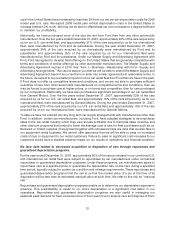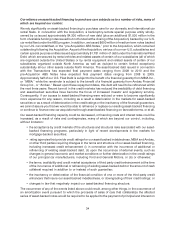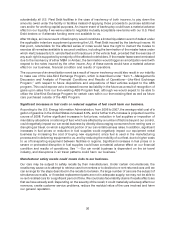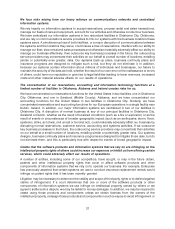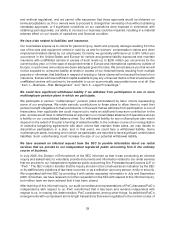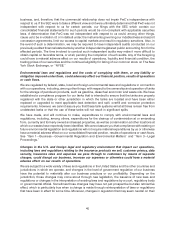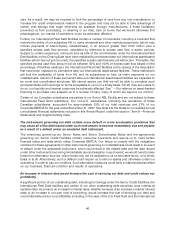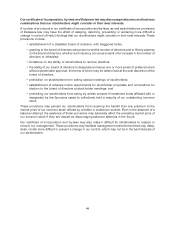Hertz 2007 Annual Report Download - page 61
Download and view the complete annual report
Please find page 61 of the 2007 Hertz annual report below. You can navigate through the pages in the report by either clicking on the pages listed below, or by using the keyword search tool below to find specific information within the annual report.face may have either more or less impact on us than on our competitors, depending on the
circumstances.
The optional liability insurance policies and products providing insurance coverage in our domestic car
rental operations are conducted pursuant to limited licenses or exemptions under state laws governing
the licensing of insurance providers. In our international car rental operations, our offering of optional
products providing insurance coverage historically has not been regulated. Any changes in the law in
the United States or internationally that change our operating requirements with respect to insurance
could increase our costs of compliance or make it uneconomical to offer such products, which would
lead to a reduction in revenues. For instance, in some countries of the European Union, the regulatory
environment for insurance intermediaries is evolving, and we cannot assure you either that we will be
able to continue offering such coverage without substantial changes in our offering process or in the
terms of the coverage or that such changes, if required, would not render uneconomic our continued
offering of the coverage. Due to a change in law in Australia, we have discontinued sales of insurance
products there. See ‘‘Item 1—Business—Risk Management’’ for further discussion regarding how
changes in the regulation of insurance intermediaries may affect us internationally.
Laws in many countries and jurisdictions limit the types of information we may collect about individuals
with whom we deal or propose to deal, as well as how we collect, retain and use the information that we
are permitted to collect. In addition, the centralized nature of our information systems requires the
routine flow of information about customers and potential customers across national borders,
particularly into the United States. In the future, if we elect to outsource work that involves the processing
of such information, that information may flow into other countries, some of which do not possess
developed legal regimes relating to privacy and data security. If this flow of information were to become
illegal, or subject to onerous restrictions, our ability to serve our customers could be seriously impaired
for an extended period of time. Other changes in the regulation of customer privacy and data security
could likewise have a material adverse effect on our business. Privacy and data security are rapidly
evolving areas of regulation, and additional regulation in those areas, some of it potentially difficult for us
to accommodate, is frequently proposed and occasionally adopted. Thus, changes in the worldwide
legal and regulatory environment in the areas of customer privacy, data security and cross-border data
flows could have a material adverse effect on our business, primarily through the impairment of our
marketing and transaction processing activities.
Further, the substantive regulation of the rates we charge car renters, either through direct price
regulation or a requirement that we disregard a customer’s source market (location or place of
residence) for rate purposes, could reduce our revenues or increase our expenses. We set rates based
on a variety of factors including the sources of rental reservations geographically and the means through
which the reservations were made, all of which are in response to various market factors and costs. The
European Commission had issued, but has since withdrawn, a directive that could have restricted our
ability to take into account the country of residence of European Union residents for rate purposes, and
bills have periodically been introduced into the New York State legislature that would seek to prohibit us
from charging higher rates to renters residing in certain boroughs of New York City. The adoption of any
such measures could have a material adverse impact on our revenues and results of operations.
In most places where we operate, we pass through various expenses, including the recovery of vehicle
licensing costs and airport concession fees, to our rental customers as separate charges. In the last five
years, such pass-throughs have been questioned by several State Attorneys General and class actions
have been filed in four states challenging the propriety of certain pass-throughs. We believe that our
expense pass-throughs, where imposed, are properly disclosed and are lawful, and expense
pass-throughs have, when challenged, been upheld in court. Nonetheless, we cannot offer assurances
that other State Attorneys General will not take enforcement action against us with respect to our car
rental expense pass-throughs, or that our pass-throughs will not be the subject of other class action
litigation. If such action were taken and an Attorney General or class action plaintiff were to prevail, it
41


